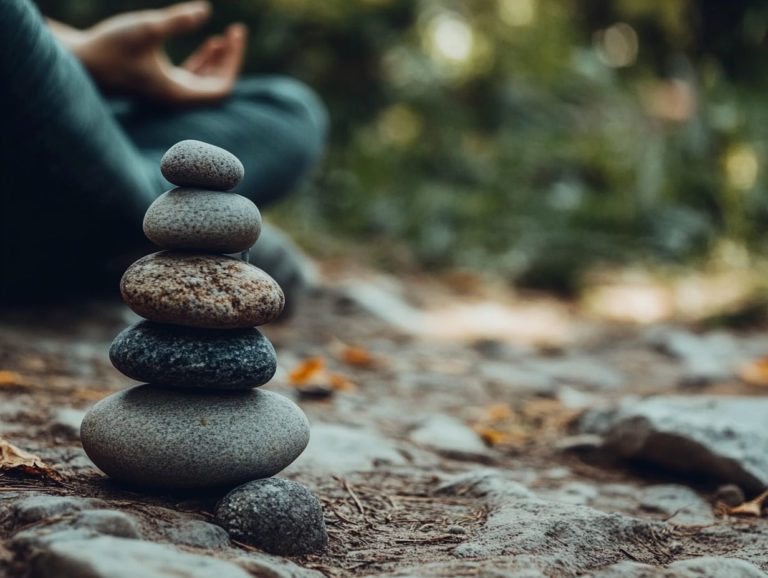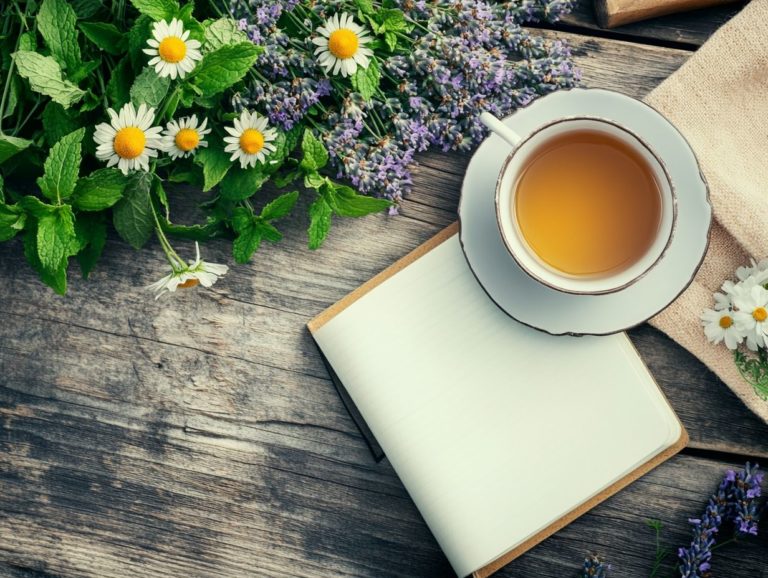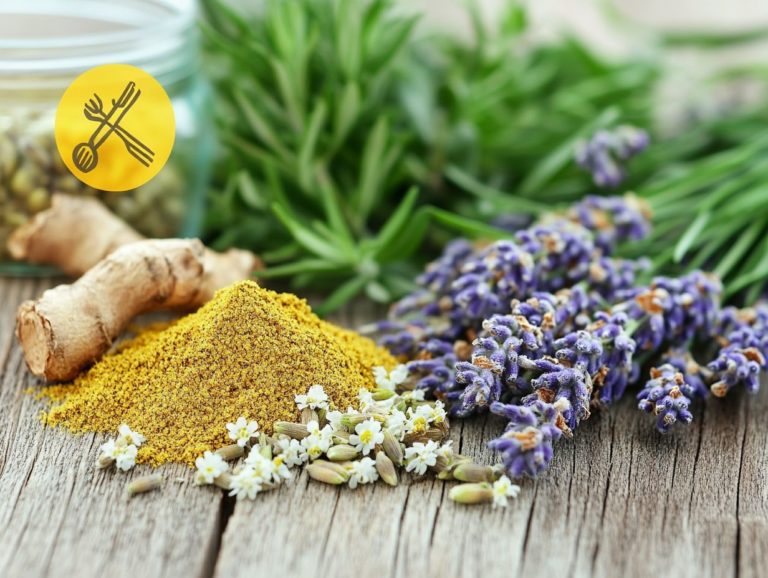Essential Oils: A Natural Anxiety Solution
Are you one of the millions feeling overwhelmed by anxiety? You’re not alone! Anxiety touches the lives of millions, profoundly influencing health and daily routines. It particularly contributes to mental health challenges for many.
This article delves into the complex nature of anxiety, beginning with its common symptoms and the effects it has on overall well-being. You ll discover how essential oils can serve as a natural remedy, fostering relaxation, enhancing sleep quality, and uplifting your mood to promote emotional balance.
We provide guidance on how to choose the right oils and share effective methods for their use while emphasizing crucial safety precautions. Learn how to seamlessly integrate these soothing scents into your daily life.
Dive in to explore this holistic approach to managing anxiety.
Contents
- Key Takeaways:
- Anxiety and its Impact on Health
- Benefits of Essential Oils for Anxiety
- Relaxation and Stress Reduction
- Improved Sleep and Mood
- Choosing the Right Essential Oils
- Methods of Using Essential Oils for Anxiety
- Safety Precautions when Using Essential Oils
- Incorporating Essential Oils into Your Daily Routine
- Frequently Asked Questions
- What are essential oils and how are they used to treat anxiety?
- Which essential oils are considered the most effective for anxiety relief?
- Is it safe to use essential oils for anxiety?
- Want to know how to effectively use essential oils for anxiety relief?
- Are there any contraindications or side effects to using essential oils for anxiety?
- Can essential oils be used as a standalone treatment for anxiety?
Key Takeaways:
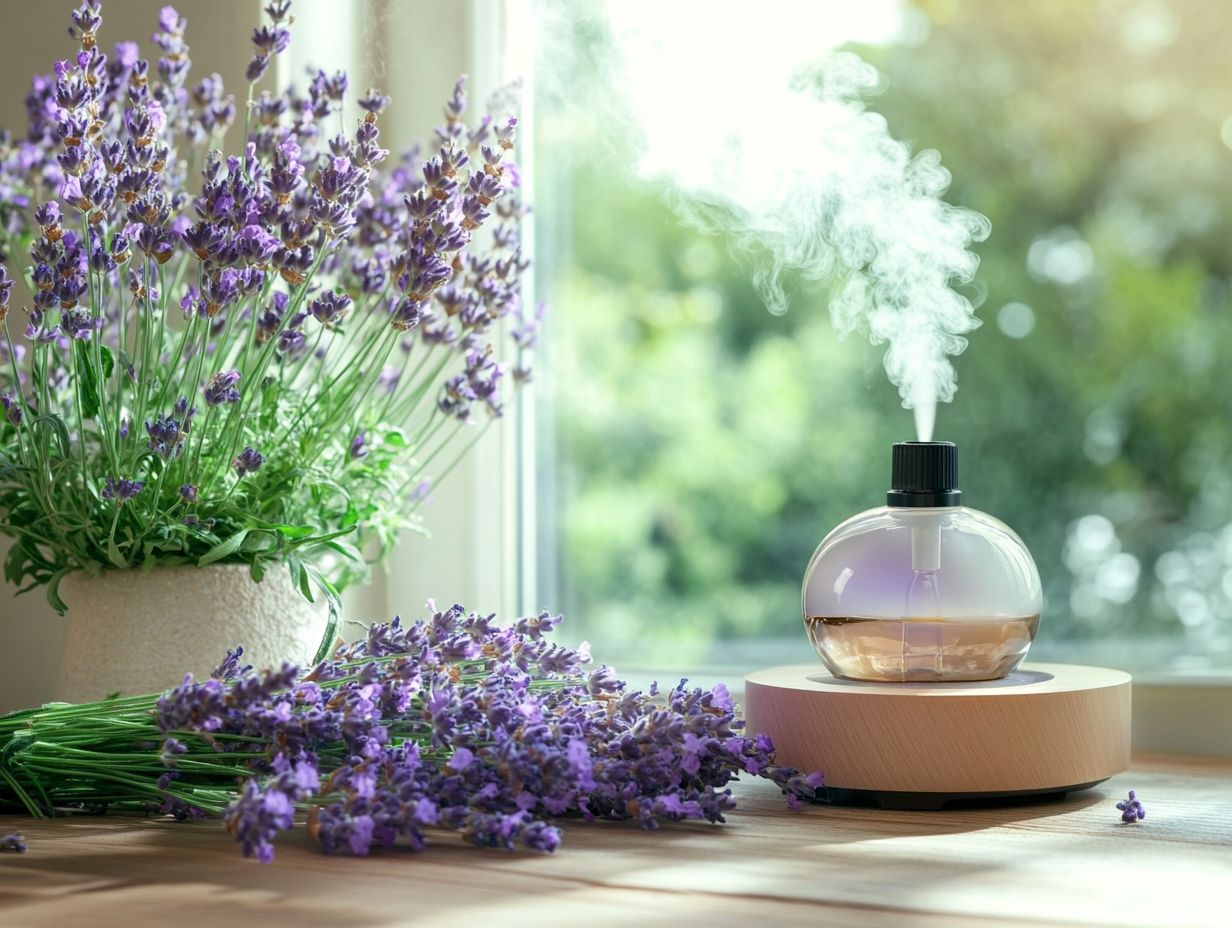
- Essential oils can effectively help reduce anxiety by promoting relaxation and improving mood and sleep, making them a natural and holistic solution for those struggling with anxiety disorders.
- When using essential oils for anxiety relief, it is important to choose the right oils and use them safely through methods such as inhalation, topical application, and diffuser use. Be mindful of potential allergies and dilution techniques.
- To reap the long-term benefits of essential oils for anxiety, incorporate them into daily routines and utilize tips for consistent and effective use.
Anxiety and its Impact on Health
Anxiety stands as a prominent mental health challenge, profoundly influencing both physical health and emotional well-being for millions around the world. It can take on various forms, particularly through anxiety disorders, which induce significant distress and pave the way for a range of health complications.
Research has shown that the enduring nature of anxiety can amplify stress, creating a vicious cycle that further undermines overall health. Grasping the implications of anxiety and recognizing its symptoms is essential for mastering stress management, enabling individuals to pursue the right remedies and treatments for a more harmonious emotional state.
Understanding Anxiety and its Symptoms
Understanding anxiety requires you to recognize its many symptoms, which often present both psychological and physical manifestations. Think excessive worry, restlessness, and fatigue.
These symptoms can disrupt your daily life significantly, making it difficult to concentrate at work, fully engage in social activities, or even tackle routine tasks. You might experience heightened heart rates and sweating in stressful situations, which can trigger avoidance behaviors, leaving you feeling increasingly isolated. Persistent anxious thoughts can interfere with your sleep, resulting in exhaustion and irritability.
Anxiety affects more than just your mental well-being; it can strain your relationships and hinder your overall productivity. It is essential to grasp its full impact on your life.
Benefits of Essential Oils for Anxiety
The use of essential oils for anxiety relief has become a popular natural remedy, offering a wealth of health benefits that support navigating anxiety with natural remedies and emotional balance.
Aromatherapy, the use of scents from essential oils, provides calming effects that can significantly alleviate anxiety symptoms, creating a tranquil environment for relaxation.
Research indicates that certain high-quality essential oils made for healing purposes, when applied thoughtfully, can uplift your mood and enhance overall mental health, positioning them as a valuable ally in your journey toward reiki healing for anxiety.
Relaxation and Stress Reduction
Essential oils are celebrated for their remarkable calming effects. They serve as a potent ally in your quest for relaxation and stress reduction in your daily routine.
When you combine these oils with various relaxation techniques, their benefits truly soar. For example, integrating essential oils into your breathing exercises elevates your calming experience. Scents like lavender and chamomile are particularly known for their ability to soothe anxieties and foster tranquility.
Adding these oils to your massage therapy transforms the experience. Bergamot and ylang-ylang are excellent choices that help relieve muscle tension while simultaneously engaging your senses. The right blend offers a holistic approach to stress relief, encouraging both mental clarity and physical relaxation ideal for anyone striving to find balance in a hectic life.
Improved Sleep and Mood
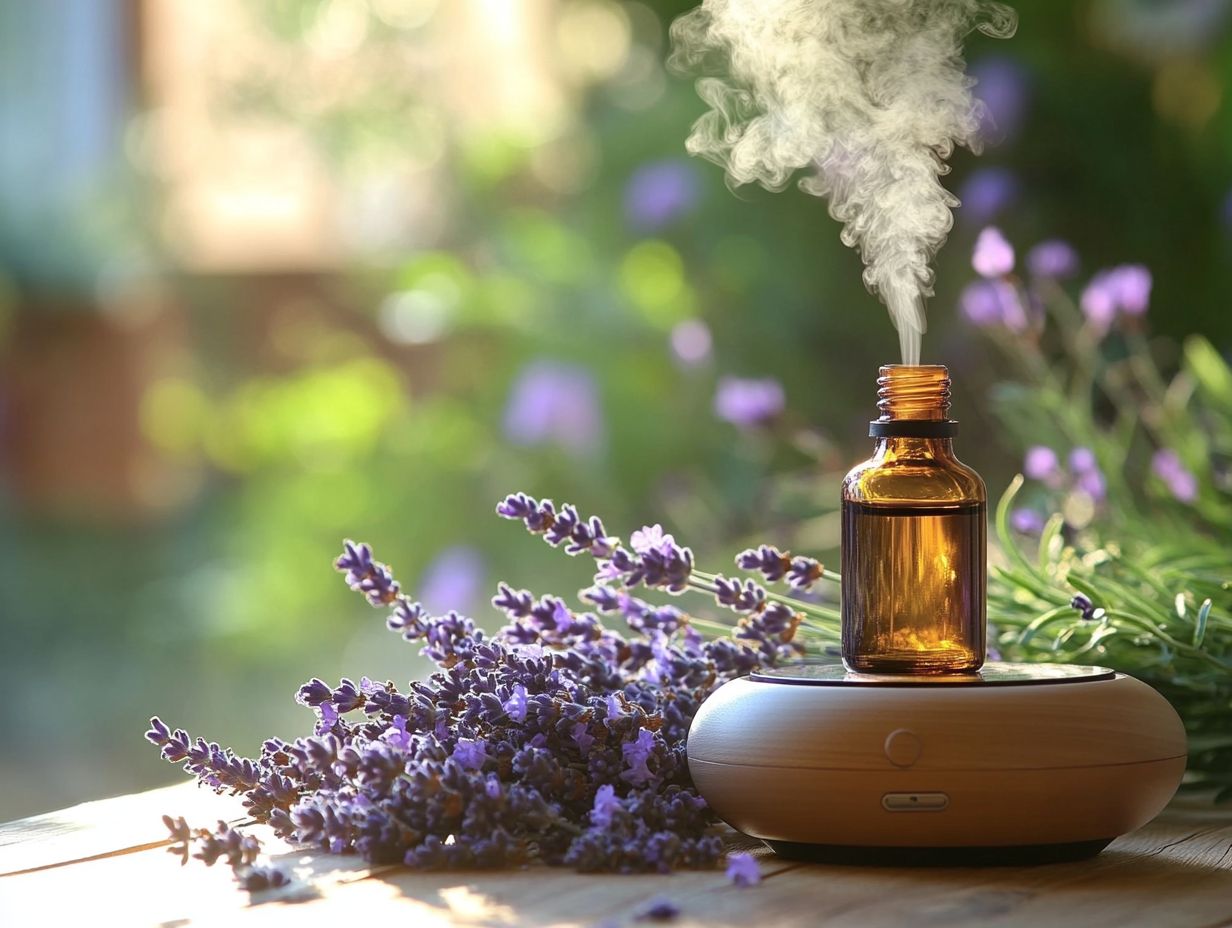
Using essential oils as natural remedies can dramatically boost your sleep quality and serve as effective mood boosters, contributing to your overall emotional well-being.
Lavender and ylang-ylang are among the most celebrated options, revered for their calming aromas. Lavender is often praised for its remarkable ability to promote relaxation and ease anxiety, making it an ideal companion for your bedtime rituals.
Ylang-ylang, with its sweet, floral scent, lifts your mood and helps maintain emotional balance, creating an environment that facilitates restorative sleep.
Prioritizing sleep hygiene and incorporating these essential oils into your nightly routine through diffusing or topical application cultivates a tranquil atmosphere that enhances relaxation and supports your mental clarity for the day ahead.
Choosing the Right Essential Oils
Choosing the right essential oils for anxiety relief is essential for maximizing their therapeutic benefits while ensuring safe application. With a vast array of options at your disposal, understanding the unique properties of each essential oil is crucial.
Using carrier oils (oils that dilute essential oils for safe application) for dilution is vital, especially if you have sensitive skin. It enhances the safety of your application and boosts the effectiveness of essential oil blends crafted to promote emotional balance.
Best Oils for Anxiety Relief
- Lavender oil: Hailed for its soothing properties.
- Chamomile: Promotes relaxation and enhances sleep quality when diffused in the evening.
- Bergamot: Lifts your mood and acts as a natural antidepressant.
- Ylang-ylang: Lowers heart rates and reduces blood pressure, contributing to tranquility.
To amplify their effects, consider crafting your own essential oil blends. For instance, combining lavender and bergamot creates a powerful synergy that enhances anxiety relief.
By using these oils through methods like diffusing, inhalation (breathing in the scent directly from the bottle or a diffuser), or adding them to your bathwater, you can transform any space into a calming sanctuary.
Methods of Using Essential Oils for Anxiety
Explore various methods to harness the power of essential oils for anxiety, such as inhalation, topical application, and using a diffuser.
Each approach offers distinct advantages in fostering a sense of calm and relaxation, allowing you to tailor your experience to suit your needs.
Start your journey towards calm today by experimenting with these essential oils!
Inhalation, Topical Application, and Diffusion
Inhaling essential oils whether through a diffuser or directly from the bottle is a popular way to find calm. It provides immediate relaxation and effectively eases anxiety symptoms.
When using a diffuser, remember to dilute the essential oils with water and follow the manufacturer s instructions for the best results. This method fills the room with the oil’s soothing aroma, creating a serene atmosphere that invites calm.
If you prefer applying oils directly to your skin, mix them with a neutral oil that helps dilute essential oils. Apply this mixture to pulse points like your wrist or behind your ears. This approach offers a personal touch for direct relief. Always perform a patch test before full application to avoid any potential skin irritation.
Both inhalation techniques can foster a sense of tranquility and grounding, making them invaluable tools for managing anxiety.
Safety Precautions when Using Essential Oils
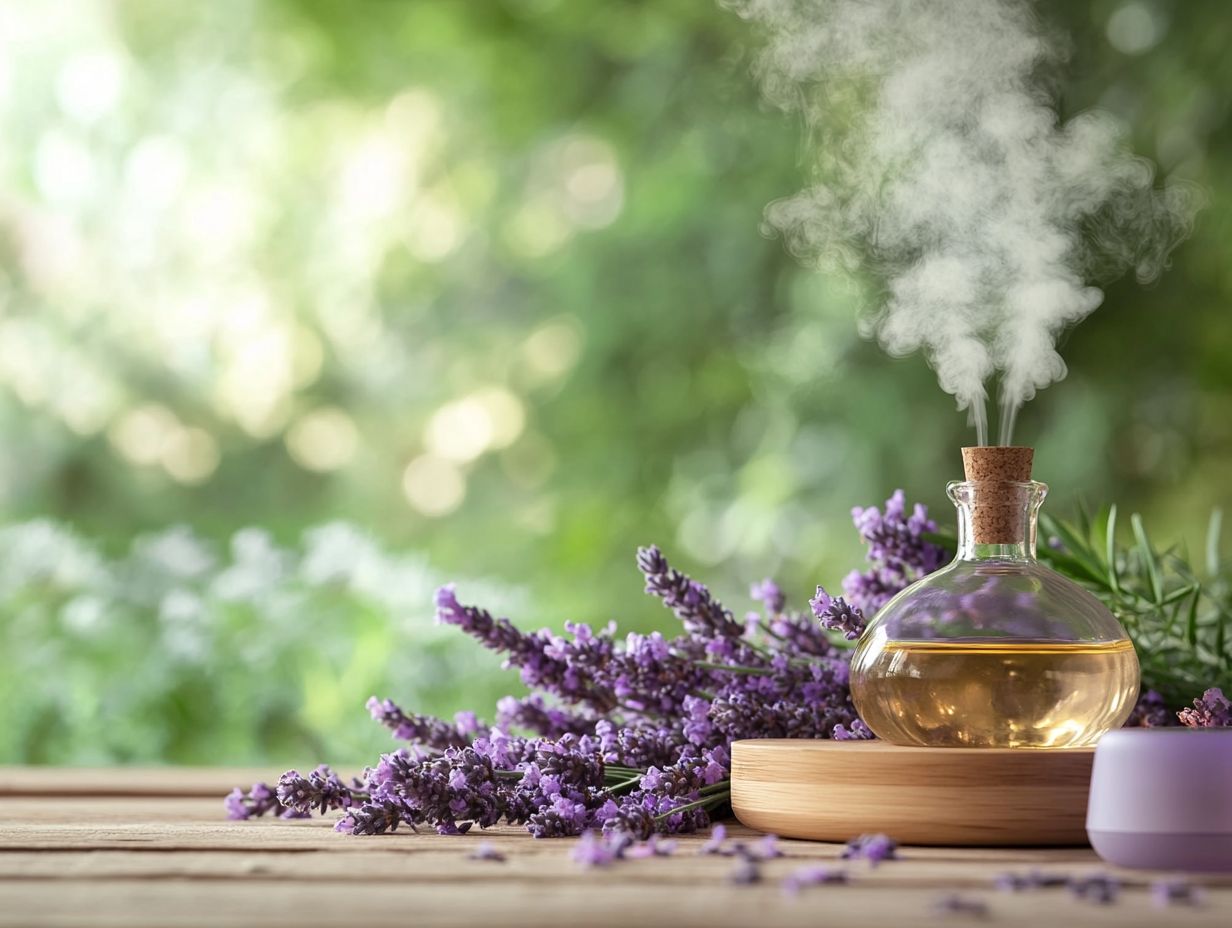
Safety is crucial when using essential oils. Always ensure proper dilution and conduct patch tests to protect against allergic reactions and skin sensitivities.
Taking these steps enhances your experience and provides peace of mind as you explore the benefits of these potent oils.
Dilution and Allergy Concerns
Diluting your oils is essential for safe use. Using undiluted oils can lead to severe skin reactions and allergies that you want to avoid.
By properly diluting essential oils with neutral oils, you not only enhance their effectiveness but also significantly lower the risk of adverse reactions. A general guideline is to use 1 to 5 drops of essential oil per teaspoon of neutral oil, tailored to the oil’s potency and your intended use.
Neutral oils like jojoba, coconut, and almond oil do more than just serve as a buffer; they also nourish and hydrate your skin. If you have sensitive skin or a history of allergies, it’s wise to conduct a patch test. Apply a small, diluted amount on a discreet area and watch for any reactions.
This simple precaution helps identify potential allergies and ensures a more enjoyable experience with essential oils.
Incorporating Essential Oils into Your Daily Routine
Using essential oils daily can transform how you manage stress and support your emotional balance.
Tips and Strategies for Long-Term Use
Implementing effective tips and strategies for long-term use can amplify the benefits of essential oils, enhancing your relaxation techniques and emotional balance.
By establishing a consistent routine, you can seamlessly incorporate these oils into your daily practices. For instance, diffusing calming oils like lavender or bergamot during meditation creates a soothing atmosphere that invites relaxation.
Don t hesitate to experiment with different blends; this will help you discover which combinations resonate best with your personal emotional needs. Keeping track of the impact these oils have on your well-being perhaps by maintaining a journal can offer valuable insights. This approach allows you to adjust your usage, ultimately fostering a greater sense of peace and well-being.
Frequently Asked Questions
What are essential oils and how are they used to treat anxiety?
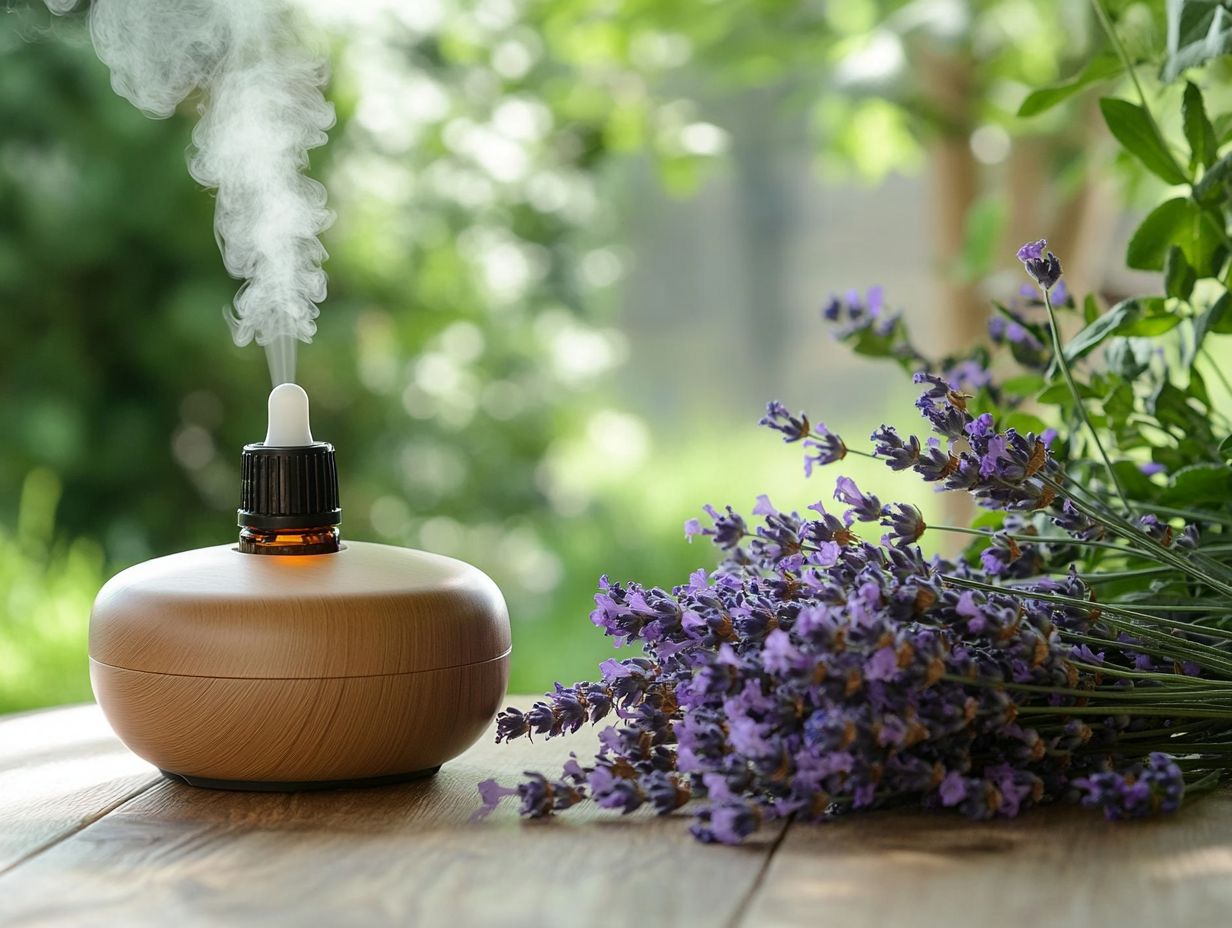
Essential oils are highly concentrated plant extracts that capture the aroma and beneficial properties of the plants. They can be used topically, inhaled, or ingested to help alleviate anxiety symptoms, much like Kava Kava: a natural solution for anxiety.
Which essential oils are considered the most effective for anxiety relief?
Commonly recommended essential oils for anxiety relief include lavender, chamomile, bergamot, and frankincense due to their calming and soothing properties.
Is it safe to use essential oils for anxiety?
When used properly and in moderation, essential oils can be a safe option for managing anxiety. For those looking for alternatives, exploring natural ways to manage anxiety attacks can also be beneficial. However, it is crucial to dilute essential oils with a carrier oil (a neutral oil that helps spread essential oils safely) and to avoid using them on children and pregnant women without consulting a healthcare professional.
Want to know how to effectively use essential oils for anxiety relief?
There are several exciting methods to use essential oils for anxiety relief:
- Massage
- Diffusing
- Adding them to bath water
- Applying them to pulse points (specific areas on the body where blood vessels are close to the skin)
It is crucial to follow proper dilution and usage instructions for each oil.
Are there any contraindications or side effects to using essential oils for anxiety?
While essential oils are generally safe, some potential side effects and contraindications exist. Certain oils may cause skin irritation or interact with specific medications. It’s essential to do research and consult a healthcare professional before use.
Can essential oils be used as a standalone treatment for anxiety?
Essential oils can be a helpful addition to a comprehensive treatment plan for anxiety! However, they should not be relied upon as the sole treatment method. For those looking for additional support, exploring natural remedies for general anxiety relief is important, but it is also essential to address any underlying causes of anxiety and to seek professional help if needed.
Before starting any treatment plan, please consult with a healthcare professional to ensure safety and effectiveness.

